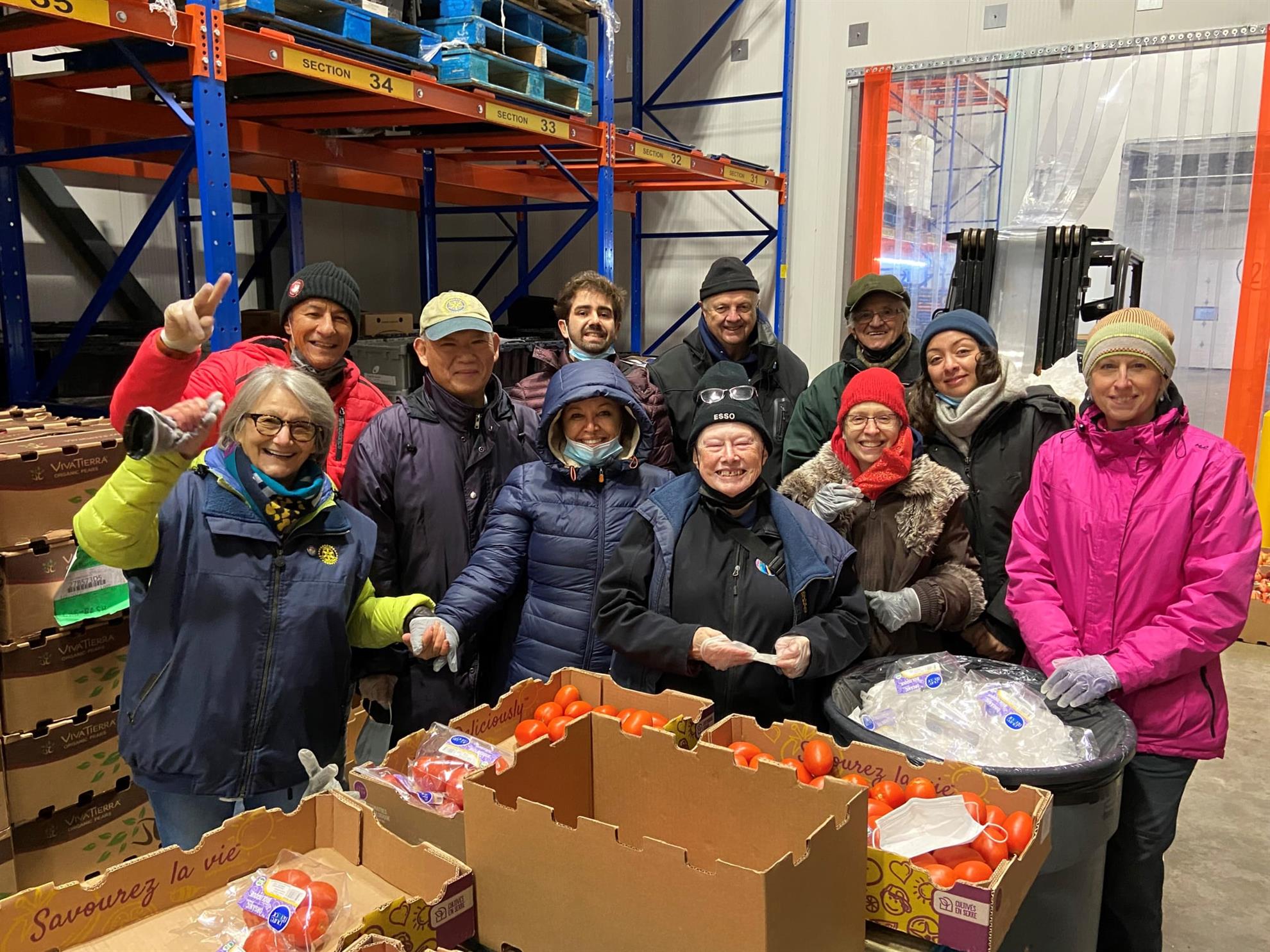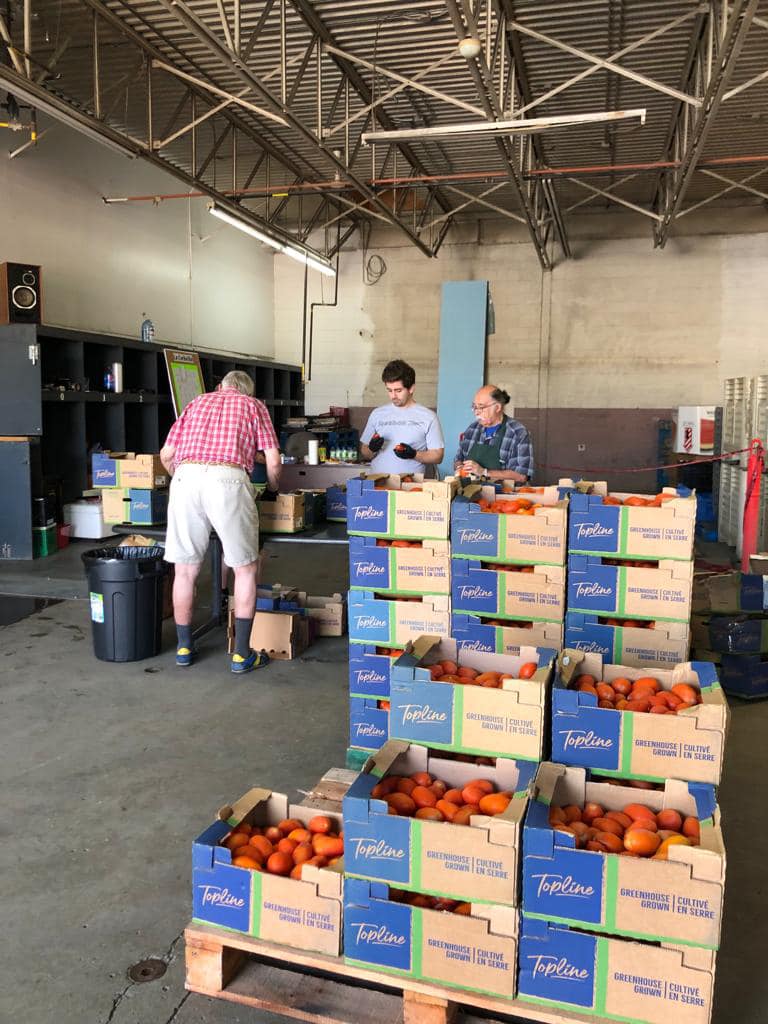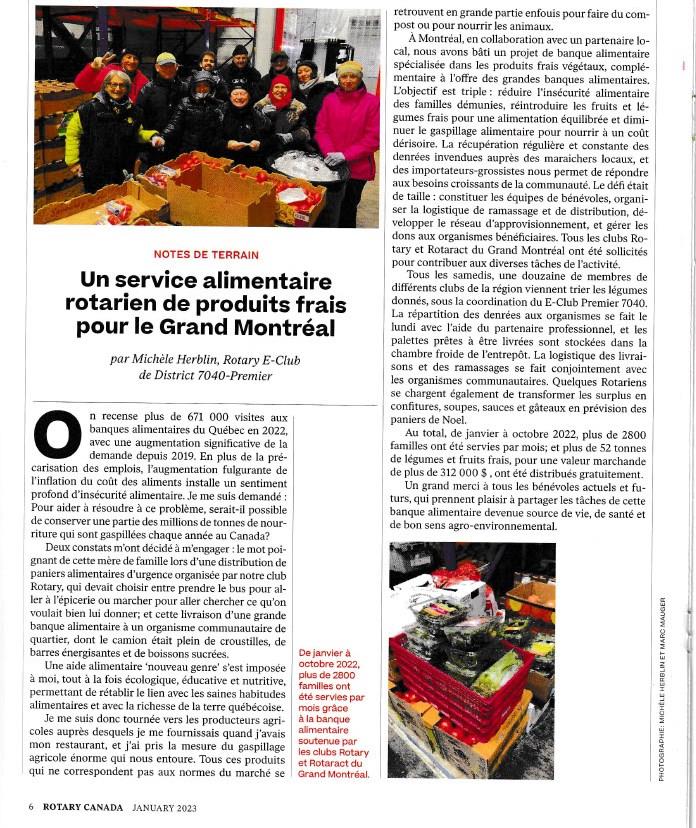 |
|
A 'new kind' of food security was imposed on me, one that was ecological, educational, and nutritious and that would allow me to re-establish the link with healthy eating habits and with the richness of Quebec's land. I therefore turned to the agricultural producers I used to buy from when I had my restaurant, and I became aware of the enormous agricultural waste that surrounds us. All of these products that do not correspond to market standards end up being buried for the most part to make compost or to feed animals.
In Montreal, in collaboration with a local partner, we have built a food bank project specializing in fresh vegetable-based products, as a complement to the offer of the major food banks.
 |
|
 |
The objective is threefold: to reduce food insecurity for poor families, to reintroduce fresh fruits and vegetables for a balanced diet and reduce food waste. The regular and constant recuperation of unsold foodstuffs from local growers and importers-wholesalers enables us to meet the growing needs of the community and also to feed people at a minimal cost. The challenge was great: building teams of volunteers, coordinating the pickup and distribution logistics, developing the supply network, and overseeing the donations to the recipient organizations. All Rotary and Rotaract clubs in the Greater Montreal area were called upon to contribute to the various tasks of the activity.
Every Saturday, under the coordination of the Premier 7040 E-Club, a dozen members of different Rotary and Rotaract clubs of the Montreal area participate in the sorting of donated vegetables. The distribution of the food to the organizations is done on Monday with the help of a professional partner and the pallets ready to be delivered are stored in the refrigerated room of the warehouse. The logistics of the deliveries and pickups are done in conjunction with the community agencies. A few Rotarians also process the excess produce into jams, soups, sauces, and cakes to be used in Christmas baskets.
In total, from January to October 2022, over 2800 families were being served each month. Over 52 tons of fresh vegetables and fruits, with a market value of over $312,000, were distributed to these families free of charge.
A special thank you to all the current and future volunteers who enjoy sharing the tasks of this food bank which has become a source of life, health, and agri-environmental good will. From January to October 2022, more than 2,800 families were served each month through the food bank supported by the Rotary and Rotaract clubs of Greater Montreal.
Un service alimentaire rotarien de produits frais pour le Grand Montréal
On recense plus de 671 000 visites par mois aux banques alimentaires du Québec en 2022, avec une augmentation significative de la demande depuis 2019. En plus de la précarisation des emplois, l’augmentation fulgurante de l’inflation du coût des aliments installe un sentiment profond d’insécurité alimentaire. Je me suis demandé : Pour aider à résoudre ce problème, serait-il possible de conserver une partie des millions de tonnes de nourriture qui sont gaspillées chaque année au Canada?
Deux constats m’ont décidé à m’engager : le mot poignant de cette mère de famille lors d’une distribution de paniers alimentaires d’urgence organisée par notre club Rotary, qui devait choisir entre prendre le bus pour aller à l’épicerie ou marcher pour aller chercher ce qu’on voulait bien lui donner, et cette livraison d’une grande banque alimentaire à un organisme communautaire de quartier dont le camion était plein de croustilles, de barres énergisantes et de boissons sucrées.
Une aide alimentaire ‘nouveau genre’ s’est imposée à moi, tout à la fois écologique, éducative et nutritive, permettant de rétablir le lien avec les saines habitudes alimentaires et avec la richesse de la terre québécoise. Je me suis donc tournée vers les producteurs agricoles auprès desquels je me fournissais quand j’avais mon restaurant, et j’ai pris la mesure du gaspillage agricole énorme qui nous entoure. Tous ces produits qui ne correspondent pas aux normes du marché se retrouvent en grande partie enfouis pour faire du compost ou pour nourrir les animaux.
À Montréal, en collaboration avec un partenaire local, nous avons bâti un projet de banque alimentaire spécialisée dans les produits frais végétaux, complémentaire à l’offre des grandes banques alimentaires.
L’objectif est triple : réduire l’insécurité alimentaire des familles démunies, réintroduire les fruits et légumes frais pour une alimentation équilibrée et diminuer le gaspillage alimentaire pour nourrir à un coût dérisoire. La récupération régulière et constante des denrées invendues auprès des maraîchers locaux et des importateurs-grossistes nous permet de répondre aux besoins croissants de la communauté. Le défi était de taille : constituer les équipes de bénévoles, organiser la logistique de ramassage et de distribution, développer le réseau d’approvisionnement en plus de gérer les dons aux organismes bénéficiaires. Tous les clubs Rotary et Rotaract du Grand Montréal ont été sollicités pour contribuer aux diverses tâches de l’activité.
Tous les samedis, une douzaine de membres de différents clubs de la région viennent trier les légumes donnés, sous la coordination du E-Club Premier 7040. La répartition des denrées aux organismes se fait le lundi avec l’aide du partenaire professionnel et les palettes prêtes à être livrées sont stockées dans la chambre froide de l’entrepôt. La logistique des livraisons et des ramassages se fait conjointement avec les organismes communautaires. Quelques Rotariens se chargent également de transformer les surplus en confitures, soupes, sauces et gâteaux destinés aux paniers de Noël.
Au total, de janvier à octobre 2022, plus de 2800 familles ont été servies chaque mois. Plus de 52 tonnes de légumes et fruits frais, pour une valeur marchande de plus de 312 000 $, ont été distribuées gratuitement.
Un grand merci à tous les bénévoles actuels et futurs qui prennent plaisir à partager les tâches de cette banque alimentaire devenue source de vie, de santé et de bon sens agroenvironnemental.
De janvier à octobre 2022, plus de 2800 familles ont été servies chaque mois grâce à la banque alimentaire soutenue par les clubs Rotary et Rotaract du Grand Montréal.